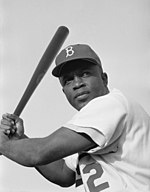
Jackie Robinson
American baseball player
Abebe Bikila was an Ethiopian marathon runner who was the first Ethiopian Olympic gold medalist, winning two consecutive Olympic gold medals in the marathon. He was a trailblazer for East African runners, and despite a tragic car accident that left him paralyzed, he continued to compete in sports for the disabled.
Table of Contents
Shambel Abebe Bikilawas an Ethiopian marathon runner who was a back-to-back Olympic marathon champion. He was the first Ethiopian Olympic gold medalist, winning his first gold medal at the 1960 Summer Olympics in Rome while running barefoot. At the 1964 Tokyo Olympics, he won his second gold medal, making him the first athlete to successfully defend an Olympic marathon title. In both victories, he ran in world record time.
Born in Shewa, Abebe moved to Addis Ababa around 1952 and joined the 5th Infantry Regiment of the Ethiopian Imperial Guard, an elite infantry division that safeguarded the emperor of Ethiopia. Abebe served in the Kagnew Battalion during the Korean War.
Enlisting as a soldier before his athletic career, he rose to the rank of shambel (captain). Abebe participated in a total of sixteen marathons. He placed second on his first marathon in Addis Ababa, won twelve other races, and finished fifth in the 1963 Boston Marathon. In July 1967, he sustained the first of several sports-related leg injuries that prevented him from finishing his last two marathons. Abebe was a pioneer in long-distance running. Mamo Wolde, Juma Ikangaa, Tegla Loroupe, Paul Tergat, and Haile Gebrselassie–all recipients of the New York Road Runners’ Abebe Bikila Award–are a few of the athletes who have followed in his footsteps to establish East Africa as a force in long-distance running.
On March 22, 1969, Abebe was paralysed due to a car accident. He regained some upper-body mobility, but he never walked again. While he was receiving medical treatment in England, Abebe competed in archery and table tennis at the 1970 Stoke Mandeville Games in London. Those games were an early predecessor of the Paralympic Games. He competed in both sports at a 1971 competition for disabled people in Norway and won its cross-country sleigh-riding event. Abebe died at age 41 in 1973 of a cerebral haemorrhage related to his accident four years earlier. He received a state funeral, and Emperor Haile Selassie declared a national day of mourning. Many schools, venues, and events, including Abebe Bikila Stadium in Addis Ababa, are named after him. He is the subject of biographies and films documenting his athletic career, and he is often featured in publications about the marathon and the Olympics.
Abebe Bikila was an Ethiopian marathon runner who was the first Ethiopian to win an Olympic gold medal, which he did by winning the marathon at the 1960 and 1964 Summer Olympics.
Abebe Bikila won the 1960 Olympic marathon in Rome while running barefoot, a unique feat at the time.
Abebe Bikila won his first Olympic gold medal in the 1960 Rome Olympics and then successfully defended his title at the 1964 Tokyo Olympics, becoming the first athlete to win consecutive Olympic marathon titles.
Abebe Bikila enlisted in the Ethiopian Imperial Guard before his athletic career and rose to the rank of shambel (captain) while serving in the Kagnew Battalion during the Korean War.
In 1969, Abebe Bikila was paralyzed due to a car accident, but he continued to compete in sports for the disabled, including archery and table tennis at the 1970 Stoke Mandeville Games in London.
Abebe Bikila was a pioneer in long-distance running, and many athletes like Mamo Wolde, Juma Ikangaa, Tegla Loroupe, Paul Tergat, and Haile Gebrselassie have followed in his footsteps to establish East Africa as a force in the sport.
Abebe Bikila received a state funeral, and Emperor Haile Selassie declared a national day of mourning. Many schools, venues, and events, including Abebe Bikila Stadium in Addis Ababa, are named after him.